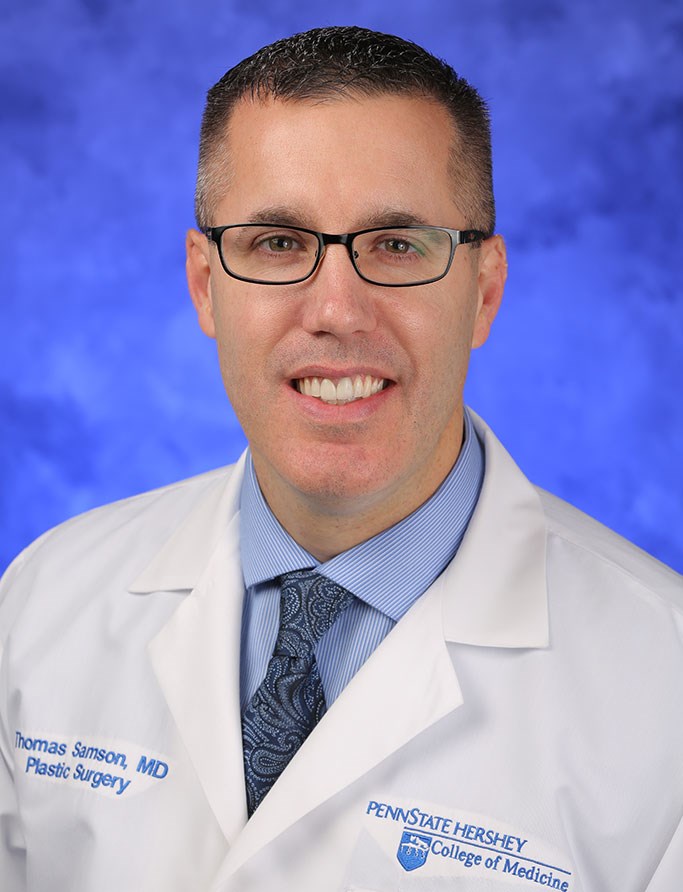Faculty Focus: Q&A with Thomas Samson, MD

In this installment of Faculty Focus, we present ASPS member Thomas Samson, MD, associate professor of Surgery, Pediatrics and Neurosurgery, and Surgeon-in-Chief at Penn State Health Children's Hospital, Hershey, Pa.
Dr. Samson completed medical school at Creighton University School of Medicine, Omaha, Neb., and his general surgery residency at General Mayo Clinic, Phoenix. He completed his plastic surgery residency at Milton S. Hershey Medical Center, Hershey, Pa., and a craniofacial fellowship at The Hospital for Sick Children, University of Toronto. Dr. Samson believes residents can control their own destinies by stepping forward – and must put their families before anything else. A heartfelt and meaningful response by his colleagues to a family crisis during residency drew Dr. Samson closer than ever to Penn State, where he continues his career as a respected and sought-out faculty member.
PSR: What drew you to plastic surgery?
Dr. Samson: I rotated on a craniofacial service and Day 1 consisted of a bilateral cleft lip repair followed by a sagittal synostosis repair. The combination of precise, detailed surgery with absolutely no templates to follow was exactly what I was looking for – I was hooked.
PSR: How did you prepare for a competitive fellowship?
Dr. Samson: I did a general surgery residency first and set about my long-term plan on Day 1. I spent much of my free time with the plastic surgery team scrubbing cases, participating in didactics and performing research. That strategy resulted in published research in plastic surgery, as well as exposure to several plastic surgeons who subsequently played critical roles in shaping my future.
PSR: What impact did the fellowship have on your career?
Dr. Samson: My fellowship was the most critical aspect of the shaping and advancement of my career as a craniofacial surgeon. You "learn" your craft during fellowship and gain exposure to mentors who will support and guide you throughout your career.
PSR: How important is a mentor on the early years of practice?
Dr. Samson: Having a mentor is absolutely vital to your early years. They act as sounding boards, long-term strategists and counselors. It's a good thing they don't charge for their services.
PSR: How has your involvement in societies and committees helped your career?
Dr. Samson: Involvement in societies and committees, especially early in your career, sets the stage for your career. Academic practice lends itself to this involvement – but you have to take the first step.
PSR: What's the most important attribute for a successful resident?
Dr. Samson: Attention to detail. If you demand this of yourself in all you do, you will perform at the highest level and be a leader amongst others. I feel if you are going to do it, do it right.
PSR: How do you balance your professional and personal lives?
Dr. Samson: Prioritize and stick to it. Family is Priority No.1 for me and always will be. When I'm at work, I focus and commit. When I leave work, my focus shifts to my family. You only get one chance to be there for your family – don't compromise them.
PSR: What was your greatest non-training challenge of residency – and how did you handle that?
Dr. Samson: My wife and I had a miscarriage during my chief year and our families were 3,000 miles away. The attendings and their spouses and my co-residents rallied and became our "family" during a very challenging time. This experience played a large part in choosing to come back on faculty at Penn State after fellowship. That was 12 years ago.
PSR: What do you enjoy most about being a plastic surgeon?
Dr. Samson: The complexity and variety of cases, and working with residents and my pediatric patients bring me great satisfaction. My job is never "work."
PSR: What are some of the challenges you regularly encounter in your practice?
Dr. Samson: Not having enough time. I do charting, dictations and answer emails once the house is asleep.
PSR: How does teaching play a role in your schedule?
Dr. Samson: It's enmeshed into my daily schedule. I don't think you can carve-out time for teaching in our profession.
PSR: What advice do you have for plastic surgery residents?
Dr. Samson: Follow your passion and don't compromise. There are always people who will tell you can't do it. Pay absolutely no attention to them. If you want it, you can make it happen.
PSR: How would you complete this sentence? "I knew I wanted to become a plastic surgeon when..."
Dr. Samson: I saw my first cleft lip repair.